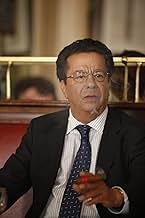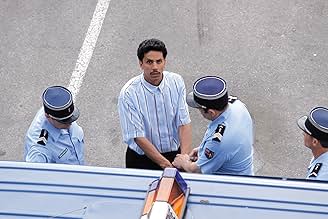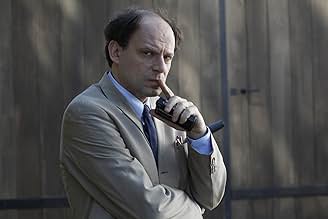Omar m'a tuer
- 2011
- 1h 25min
Aggiungi una trama nella tua linguaIn the summer of 1991 an elderly woman Ghislaine Marchal is found murdered in the basement of her home with the message "Omar M'a Tuer" (Omar has kill me) written beside in her own blood. De... Leggi tuttoIn the summer of 1991 an elderly woman Ghislaine Marchal is found murdered in the basement of her home with the message "Omar M'a Tuer" (Omar has kill me) written beside in her own blood. Despite a lack of forensic or DNA evidence, her Moroccan gardener Omar Raddad is found guilt... Leggi tuttoIn the summer of 1991 an elderly woman Ghislaine Marchal is found murdered in the basement of her home with the message "Omar M'a Tuer" (Omar has kill me) written beside in her own blood. Despite a lack of forensic or DNA evidence, her Moroccan gardener Omar Raddad is found guilty and sentenced to 18 years in a French prison. Shocked by the case, and convinced of his ... Leggi tutto
- Premi
- 2 candidature totali
- M. Sheriff
- (as Lounès Tazaïrt)
- Gendarme 2
- (as Piero Brichese)
Trama
Lo sapevi?
- QuizThe scene where Omar Raddad's defense speaks to the press outside the courthouse saying, "A hundred years ago we (France) condemned a younger officer because he was Jewish." Is a direct reference to the Dreyfus Affair. Similar to Raddad, Alfred Dreyfus was wrongfully accused and convicted of treason for passing French military secret information to German Embassy and sentenced to life imprisonment in 1894. Despite evidence proving that Dreyfus had not commit treason and a French Army general Ferdinand Walsin Esterhazy was the real culprit, Dreyfus continued to endure various court hearings in the same manner as Raddad. In both cases the French justice system was viewed as discriminating against Dreyfus who was Jewish where as Raddad is equally let down by the same system for being Arab and Muslim. Dreyfus was eventually released from prison in 1906 after serving a 12 year sentence.
- ConnessioniReferenced in C'est qui café ça? (2017)
If you're not French or Moroccan, or at least North African, chances that you're familiar with the case are rather thin. Being a Moroccan, I remember in the early months of 1994 how each daily news covered it, the picture of the gardener Omar Raddad, his supposedly victim, the rich widow and socialite Ghislaine Marchal, were faces printed in my mind, but it's thanks to the infamous "Omar Killed Me" quote that the case went down in history. The victim, after receiving multiple knife wounds, used her ultimate forces to crawl her way to a cave and write with her own blood the implacable accusation, with a spelling error obviously lost in translation. The gardener was the suspect number one, and probably guilty before trial, and fearing an escape to his country, the Police immediately arrested him.
Ever since that sordid case begun to spread the news, the quote '"someone" killed me' has entered French language as a metaphor of a desperate cry, an accusation directly addressed by the victim, whether it's a fraud, an abuse, or a firing. This is how vivid the memories are, and it was obvious that any project, any movie made about the case would use such an evocative title. I was a preteen at that time, but I followed the case with a deep interested and I even read the Academician's book "The Making of a Guilty Man" of which the film relates the making. The devil's advocate didn't believe it was an open-and-shut case and pointed the lax way it was handled by the Police and the Court while many questions were left unanswered. Besides, the very fact that Omar could barely speak French, let alone understand the questions, didn't help his defense. So, it's not much the certitude of Omar's innocence than the compassion to a man whose side wasn't given much liberty to prove his innocence.
To list a few point of uncertainties: how could the poor, agonizing woman write on the door without holding it, how could the letters be so well written? How come the Police established the hour of death the day where Omar could provide an alibi and then pretend it was a typo? How about many witnesses who gave names of potential suspects? How about the fact that the victim was quickly incinerated preventing from any counter-expertise? The attitude of the main protagonist, played by Denis Polydades, reminds of Juror #8 in "12 Angry Men", there's no conviction that Omar is either victim or innocent, but there's more than a reasonable doubt. Of course, Roshdy Zem, the director, is convinced that Raddad is innocent and adopts his opinion as an angle to the film's narrative. Naturally, such a film had to take a clear side and Samy Bouajila plays an Omar Raddad with the right amount of pathos and vulnerability, but I wish it could confront the two sides of the story with the same zeal.
I understand Roshdy Zem wanted to do a character study more than a courtroom drama and there's no doubt over the dramatic potential of the story of a wrongfully accused foreigner, not to make it a Dreyfus affair as the passionate lawyer Jacques Vergès would claim, but something closer to Hitchcock's "Wrong Man", to name another Fonda movie. Objectively, it was a puzzling case that didn't reveal all its secrets because of a botched investigation and that was an accusation more viable than the plain statement of Omar's innocence. I personally believe he is innocent, but I feel like the partiality of Zem did a disservice to his initial intent, which was to invite the Justice to re-open the case, and tackle it with more seriousness and if possible, see how the use of DNA can clear Raddad from these accusations. The film should have been more impartial for the innocence thesis' own good.
The performances were remarkable, and Samy Bouajilla deserved his nomination for the French Oscars (although he didn't look like Raddad who was taller with more delicate features, in fact, Roshdy Zem would have fitted as well). I just wished the film had focused a little more on his charismatic lawyer, the famous or infamous Jacques Vergès, former lawyer of terrorist Carlos and Klaus Barbie, whose flamboyant and erudite personality had overshadowed his client's case, inflicting so much political resonance to his defense that he became like Zola stealing Drefus' thunder. But Vergès is relegated to a secondary, in fact, tertiary level while he was probably one of the main protagonists, so it's rather puzzling for a film of such mature directing to give such a small part to such an important character, but to be completely fair, it doesn't add much to the case either.
"Omar Killed Me" simply revisits the case with a more human focus on its protagonists, but there was so much to tell about it, so much to remind us about that a documentary might have been more insightful. One reading of Wikipedia has been richer in information and insights while the film was more about Omar's struggle. But it's precisely for the sake of his rehabilitation and in tribute to his difficult journey, that the film should have had a more rational approach to the case.
- ElMaruecan82
- 1 ago 2016
- Permalink
I più visti
Dettagli
- Data di uscita
- Paesi di origine
- Lingue
- Celebre anche come
- Omar Killed Me
- Luoghi delle riprese
- Chemin de Garibondy, Le Cannet, Alpes-Maritimes, Francia(Raddad family apartment in Toulon)
- Aziende produttrici
- Vedi altri crediti dell’azienda su IMDbPro
Botteghino
- Lordo in tutto il mondo
- 4.439.826 USD
- Tempo di esecuzione1 ora 25 minuti
- Colore
- Mix di suoni
- Proporzioni
- 2.35 : 1
Contribuisci a questa pagina

























